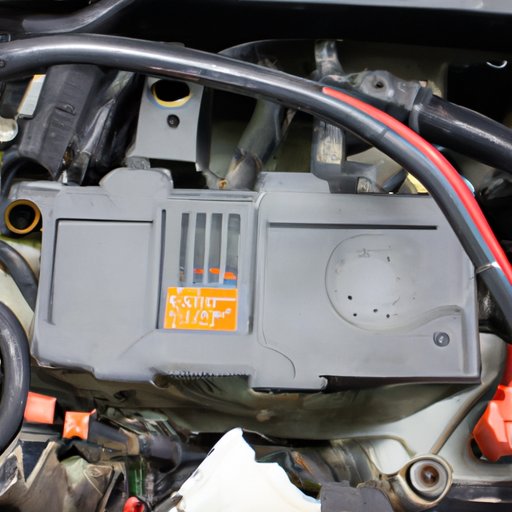
Introduction
The engine control module (ECM) is a vital component of your vehicle’s engine system. It is responsible for monitoring and controlling many of the engine’s functions, including fuel injection, ignition timing, and emissions control. When the ECM malfunctions, it can cause a variety of problems that can affect your vehicle’s performance and even lead to engine damage. In this article, we’ll explore the common symptoms of a bad ECM and what to do if you suspect your ECM is failing.
Strange Noises and Decreased Performance: Indicators of a Faulty Engine Control Module
One of the most obvious signs of a bad ECM is strange noises coming from the engine. These noises can include knocking, rattling, and whining sounds that are not normal for your vehicle. Additionally, a faulty ECM can cause decreased engine performance, including sluggish acceleration and a decrease in power.
If you experience any of these symptoms, it’s important to get your vehicle to a mechanic as soon as possible. Ignoring these signs can lead to even more serious problems, such as engine misfires, stalling, and even engine failure.
Troubleshooting Engine Problems: A Guide to Identifying Symptoms of a Bad ECM
While strange noises and decreased performance are common symptoms of a bad ECM, there are other signs to watch out for. Here are some additional symptoms that could indicate a bad ECM:
- Check engine light is on
- Difficulty starting the engine
- Poor gas mileage
- Engine misfires or stalls
- Transmission shifting problems
- Illuminated warning lights on the dashboard
Each of these symptoms can indicate a specific problem with your vehicle’s engine system. For example, poor gas mileage could mean the ECM is not regulating fuel injection properly, while transmission shifting problems could mean the ECM is not communicating with the transmission control module correctly. It’s important to address these symptoms quickly to prevent further damage to your vehicle.
Why a Bad Engine Control Module Can Wreak Havoc on Your Vehicle
A bad ECM can cause a number of problems for your vehicle’s engine system. For example, a malfunctioning ECM can result in incorrect timing for fuel injection or ignition, leading to poor performance and reduced fuel efficiency. Additionally, a bad ECM can cause the engine to run lean or rich, increasing the risk of damage to engine components such as the catalytic converter.
Ignoring the symptoms of a bad ECM can lead to larger engine problems, such as engine misfires, damaged spark plugs, and even engine failure. The longer these problems are left unchecked, the more expensive the repairs will be.
Getting to the Root of the Problem: Understanding the Signs of a Faulty Engine Control Module
A faulty ECM can affect various engine components, such as the oxygen sensor, throttle position sensor, and mass airflow sensor. When an ECM is failing, it can send incorrect signals to these components, causing them to operate incorrectly.
A mechanic can determine if an ECM is faulty by using diagnostic tools to read the engine’s computer codes. These codes can help identify the specific component that is malfunctioning and whether the problem is caused by the ECM or another component. Once the problem has been identified, the mechanic can replace the faulty part and restore proper engine performance.
Diagnosing Engine Issues: Signs of a Failing ECM
If you suspect your ECM is failing, it’s important to have it diagnosed by a qualified mechanic. The following are the steps a mechanic typically takes to diagnose a bad ECM:
- Perform a visual inspection of the engine and ECM
- Use diagnostic tools to read the engine codes
- Test the various sensors and components associated with the ECM
- Replace the faulty component or repair the wiring if necessary
- Test the engine to ensure proper performance
If the ECM needs to be replaced, the mechanic can install a new ECM and reprogram it to match your vehicle’s specifications.
When the Engine Misbehaves: Common Symptoms of a Broken Engine Control Module
In addition to the symptoms mentioned previously, there are other signs of a bad ECM to watch out for. These include:
- Failure of emission tests
- Engine overheating
- Engine surging or hesitating
- Difficulty shifting gears
- No start or intermittent start issues
If you experience any of these symptoms, it’s important to get your vehicle to a mechanic as soon as possible. These signs can indicate a serious problem with your engine system that could lead to expensive repairs if left unchecked.

Knowing the Signs of an Bad ECM: How to Spot a Failing Engine Control Module
In this article, we’ve covered the common symptoms of a bad ECM, including strange noises, decreased performance, and warning lights on the dashboard. We’ve also discussed additional symptoms to watch out for, such as poor gas mileage and transmission shifting problems. If you experience any of these symptoms, it’s important to get your vehicle to a mechanic as soon as possible.
Conclusion
Identifying the signs of a bad engine control module is essential to keeping your vehicle running smoothly. Ignoring these signs can lead to larger engine problems and more expensive repairs down the line. If you suspect your ECM is failing, don’t hesitate to seek professional assistance. A qualified mechanic can diagnose the problem and make the necessary repairs to get your vehicle back on the road. Remember, prevention is key when it comes to maintaining your vehicle’s engine system.




